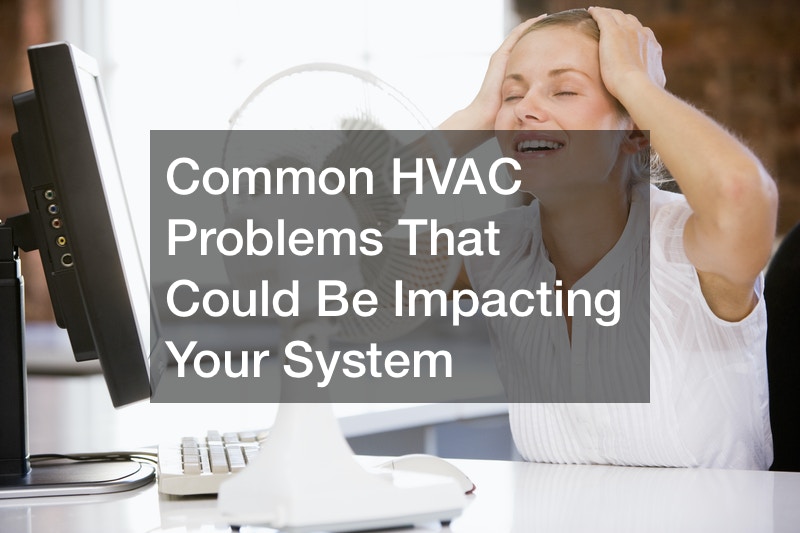Common HVAC Problems That Could Be Impacting Your System

Your home’s HVAC system is essential for keeping you and your family safe and secure during the year’s hottest and coldest seasons. But sometimes accidents happen, and you need a repair when you least expect it. A properly running HVAC system positively impacts your life. You will be able to feel comfortable in your home without worrying about the weather outside, and you will not have any problems with high energy bills throughout the year.
If you want to know what common HVAC problems look like so that you will know when to call for repairs, read the points below.
Refrigerant Leak
One of the most common repairs in air conditioner repair is a refrigerant leak. In air conditioning repair, repairing or replacing a refrigerant leak can be important in air conditioning system maintenance. The air conditioner unit you have at home could still be working despite being inefficient because of a refrigerant leak.
When your air conditioner produces cold air while the room temperature stays the same or gets warmer, there is a possibility that you have a refrigerant leak. It is better to get this problem fixed by calling a professional air conditioning service provider as soon as possible before other problems arise, such as corrosion and a short circuit that will cause more damage to your AC unit. You do not want to spend money on cheap AC repairs, don’t you?
If your cooling system produces warm air, there could be a refrigerant leak somewhere, even if it is set to cool. It would be best to call an air conditioning service provider for cooling repair lest the problem becomes worse and more expensive to fix.
Today, there are cooling systems with built-in leak detection sensors or cooling system repair kits that can help with AC leaks and refrigerant leaks like the AC Leak Sealer and AC stop leak powder. These products work by pressurizing the cooling system to pinpoint leaks within its parts and components. The products also include instructions on properly using them at home without having to pay a professional technician.
HVAC System Age
The HVAC industry is constantly growing. New HVAC systems are being installed in homes worldwide daily in modern society. However, not all HVAC units are created equal, and some HVAC system problems can occur, such as age. Like any other device, HVAC units will degrade over time, and at some point, you will need to replace your HVAC system.
But what happens if you have not replaced your HVAC unit in 15 or 20 years? You may be setting yourself up for some major issues with your cooling system down the road, and while it might seem like an easy fix right now, you could be making the problem worse over time. HVAC system age makes HVAC replacement necessary, and these are some common HVAC problems that can occur as a result of HVAC system age.
Poor Heat Circulation
A heating system is essential to your home in the winter months. If it is not heating the way you need it to, you may begin to notice certain problems in your heating system. One of the more common heating issues that you may notice is poor heat circulation.
Poor heating circulation refers to an issue where there is not enough hot air moving around throughout your home or property. This is one of the most common HVAC problems families find when they turn on their heater for the first time during fall or winter. It can also affect both large and small heating systems.
If you have a heating system with heating circulation problems, you may notice that certain rooms or areas of your home are not heating up as they should. This is often because the heating system is not working properly or efficiently enough to heat these spaces properly. For example, if you are standing in one area of your home and it feels cold while the rest of the house seems warm, then this likely means that there is already poor heating circulation flowing around throughout your heating system.
Many families overlook why their heating systems could have heating circulation issues. It is important to ensure that there is no issue with an outside heating source, heating vents, the heating system itself, or air ducts.
Some of the reasons that heating systems have poor circulation are issues with heating venting outside, heating vents in your home are blocked, bad blower motors in the heating unit, poor airflow when using heating equipment, and if there are any air ducts included in your HVAC system.
If you need heating repairs, it is important to ensure that these issues do not continue to happen to have a properly working heating system. If they do continue, you might have to call a professional for repairs as soon as possible.
Loud Noises
The residential HVAC inspection service world includes all sorts of problems. There are many issues to be aware of when you have an HVAC system installed in your home, from dirty filters to faulty compressors.
Both residential and commercial HVAC systems are prone to these issues, so owners or managers of residential spaces need to know how to spot potential problems before they become much larger ones or demand emergency HVAC repairs.
One issue relating directly to residential HVAC units is a problem related to loud noise. What specific types of loud noises should a residential inspector look out for? The two most common problems with residential units that might cause loud noises include a problem with an electrical part and a mechanical issue within either the compressor or fan coil unit.
When an individual has a residential unit inspected by a licensed contractor, you want the inspection done properly and thoroughly. Often, residential HVAC maintenance and inspection services will include a very close look at the various components of the residential unit, including specific attention to the issues that may be causing loud noises to originate from the residential unit.
One of the most common issues you will experience with residential HVAC systems is noise-related issues often caused by faulty electrical parts within your residential unit. They could include any number of items, such as a motor blower or a capacitor.
When residential HVAC units have these parts malfunctioning due to an electrical issue, those components will often screech and whine as they try to process the residential unit’s airflow.
If you hear loud noises coming from your residential unit, especially if it is mostly related to the fan itself, see if there is any evidence of scraping or other issues with the blade assembly on your residential HVAC component.
Another common problem found in residential HVAC systems is directly related to the compressor itself and may cause clunking and whining sounds if there is an issue the first time it compresses air.
Thermostat Malfunctions
Thermostat malfunctions are something that many people do not think about. However, it is much like a car’s engine light coming on in your vehicle when there is an issue with one of the components. The same thing happens with a thermostat when it begins to malfunction. It will either let you know or cease to work altogether, and the furnace or air conditioner will shut down.
When this situation occurs, problems can arise in both homes and businesses alike and should be addressed as soon as possible due to safety concerns and damage done by extreme temperatures. There are several reasons that a thermostat may not function properly in either your home or business setting.
The HVAC contractor may not have installed the thermostat properly. The wires could be connected incorrectly, or the temperature calibration could be off. Often, the sensor needs to be cleaned. If it is just dirty, you can rub some alcohol on a cotton ball and wipe it down, but if there is debris in the sensor that has caused damage, you will need to replace it instead.
Also, if wires are reversed at any point throughout the system, this will also cause issues with the proper functioning of your thermostat, which ultimately leads to problems within your HVAC unit. If the wiring turns out to be faulty, you may need to contact an experienced HVAC technician for their professional opinion and possible repair services.
Sometimes the issue is not all that serious. Suppose you have not performed routine cleaning, lubrication, or calibration checks, then your thermostat could be malfunctioning due to a lack of care and attention. Most thermostats are pretty simple to operate. However, it is good to check for possible issues with wiring connections, loose parts, and dirty sensors every few months.
There are times when even the most well-maintained thermostat will begin to act up because there is something wrong with the sensor itself, which an obstructed line of sight can often cause due to dust or other debris in between the sensor and its target, the room, which needs to be addressed.
When this occurs, the system will either shut down completely, or it will begin to overheat your HVAC unit. This problem can also manifest because of the walls you live in between your thermostat and your HVAC unit, which continues to interrupt the connection between you.
If the sensor has been damaged, you should replace it immediately since there is no way to make any repairs. If excessive amounts of debris obstruct its view, clean it off to work properly again.
Your thermostat may not be working due to issues with other components within your heating and cooling systems, such as a broken fan belt on an air conditioner or a broken compressor which you will need to contact an experienced HVAC technician for assistance.
Mechanical Wear and Tear
Mechanical wear and tear are one of the most common HVAC problems that can impact your system. As your air conditioning unit ages, the parts that cool your home naturally begin to wear out.
Both indoor and outdoor coils are susceptible to corrosion, which will lower their ability to perform even though you have not noticed system performance issues. If you notice any rust, corrosion, leaks, or mold on either coil, contact HVAV unit experts for service right away.
The compressor is responsible for compressing refrigerant gas into hot liquid. If this is not done properly, it can impact your system’s ability to function.
Depending on where you live and how much use your unit gets, tuning may need to be performed every six months to a year. This process helps keep your air conditioning system running at peak performance and removes contaminants that could affect performance and efficiency.
As valves wear out, they will stop working properly or break completely. This will result in less cool air blowing into your home and higher utility bills due to reduced efficiency.
The evaporator coil is responsible for turning liquid refrigerant back to gas so it can be cooled and turned into liquid again later. If this coil is damaged, your system will not be able to function efficiently or effectively.
If you notice any of these problems in your home’s HVAC system, contact a reputed residential HVAC installation team as soon as possible. Older systems may need to be replaced rather than repaired.
Whenever you have a home HVAC system, you want to ensure that it is always running perfectly. Once you get more of an experienced hand with your system, it becomes easier to catch problems before impacting your life too much.
Although most homeowners would prefer an HVAC system that runs smoothly and quietly, with little to no need for repairs or maintenance, the reality is that every home appliance will eventually break down.
Because of this, it is important to be familiar with some common troubleshooting tips you can use to identify problems within your HVAC system. By recognizing these early signs of trouble, you could help your unit stay in good working order for years without requiring extensive replacement or costly equipment servicing.









